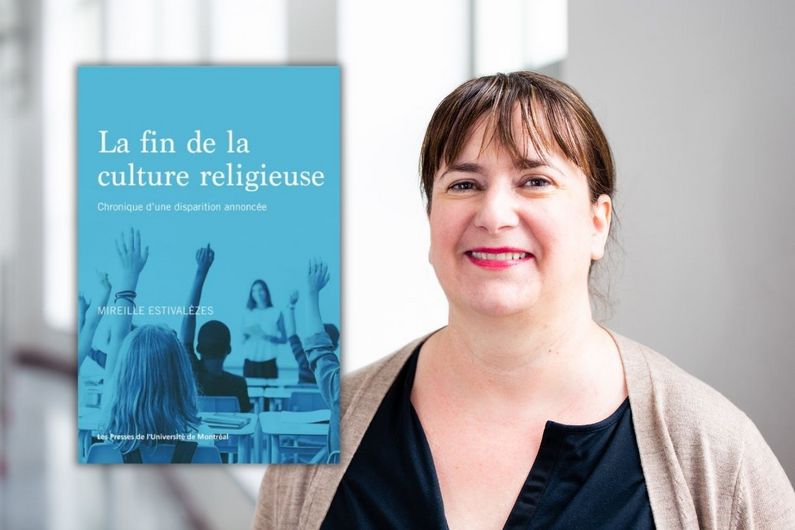Are courses in ethics and religious culture a thing of the past?
- UdeMNouvelles
11/09/2023
- Virginie Soffer
"It would be a mistake to think that post-modernity has rendered these questions obsolete," says UdeM education professor Mireille Estivalèze, who has a new book out on the subject.
In August, Les Presses de l'Université de Montréal published La fin de la culture religieuse : chronique d'une disparition annoncée (The End of Religious Culture: Chronicle of a Death Foretold). We asked its author, Faculty of Education Sciences professor Mireille Estivalèzes, whose speciality is didactics, to tell us about it.
Why did you write this book?
The idea took shape in 2020, when Jean-François Roberge, Quebec's education minister, announced that his Coalition Avenir Québec (CAQ) government would be overhauling the province's Ethics and Religious Culture (ERC) program. The minister hadn't analyzed the program or even consulted the teachers who were teaching it. He said his decision was based on expert opinions but never said who the experts were, what their expertise consisted of, or what their criticisms were. This way of doing things is problematic, both intellectually and from a democratic standpoint. It seems to me, as an academic and as a citizen, that policy decisions about the education of our youth should be based on rigorous, transparent and well-informed analysis. So I wanted to understand, analyze and contextualize the criticisms levelled at the ERC program, particularly its religious component, and to critically examine these objections. I also wanted to shed light on the machinations, political considerations and pedagogical criteria that led to the creation of the government's new Culture and Citizenship in Quebec program, which have never been properly explained to the public.
Why does the teaching of religious culture bother people in Quebec? What's wrong with it?
In my book, I show that it is important to situate the discussion about the place of religious culture in the education of young people within the broader debate about different conceptions of secularism, freedom of conscience and freedom of religion. One version of secularism recognizes the social and historical existence of religions and the role of spirituality in the lives of individuals and groups. This approach leaves room for learning about religions in school curricula and upholds freedom of religion, understood primarily as an individual right. Others understand secularism more as a principle that seeks emancipation from religions, which ought to be relegated to the private sphere. They sometimes take a negative view of religion and believe that the schools should either criticize religion or not talk about it. In this view, freedom of conscience is conceived at the collective level and citizenship takes precedence over religious affiliation. The political decision to remove religious culture from the curriculum was guided by this second view. It reflects a deep distrust of religion in the highly secular society that Quebec has become.
Where do these criticisms come from?
The criticisms come from three groups and are rooted in religious, political, secular and feminist discourses. The first group is made up of Christian parents who feel that simply exposing their children to the diversity of spiritual beliefs fosters religious relativism and violates their religious freedom. Their opposition led to two lawsuits that went all the way to Canada's Supreme Court. The second group consists of nationalist sociologists and columnists with powerful media platforms who believe that the ERC program undermines Quebec identity by promoting Canadian multiculturalism and 'reasonable accommodations' of religious minorities. The third group is made up of associations that see themselves as guardians of secularism and of feminist activists who believe that the ERC program conveys an overly positive view of religions, which are oppressive, sexist and archaic systems whose many misdeeds and discriminatory nature must be denounced. This last criticism, which saturated the media, played a decisive role in the abolition of the ERC course. It reflects many of the unfortunate tendencies of our times: the conflation of activism and scientific analysis, conspiracy theories, polarization, and the ideological and political weaponization of the debate.
Is it still appropriate to include religious culture in the curriculum?
Yes, absolutely, for at least three reasons. An organized knowledge of religions is still essential for understanding the contemporary world, in which religions continue to play an important role—just think of today’s geopolitical conflicts. It should also be borne in mind that over 80 per cent of the world's population identifies with a religious tradition, whatever their degree of religiosity or religious practice may be. The second reason has to do with understanding Quebec society, in which the influence of Christianity is still strong. We see it in the general vocabulary, in place names, architecture, literature, arts, customs, festivals, dates that are celebrated in the calendar, values that are expressed. At the same time, spiritual beliefs are becoming more diverse. So it is important to understand both our heritage and the challenges of living together. Finally, young people ask existential questions about the meaning of life, to which religions, along with philosophy and literature, can provide the seeds of an answer. It would be a mistake to think that post-modernity has rendered these questions obsolete. And one of the vital functions of school is to broaden students' horizons, to open them to perspectives wider than themselves, to introduce them to the general culture, of which religious culture is certainly a part.













